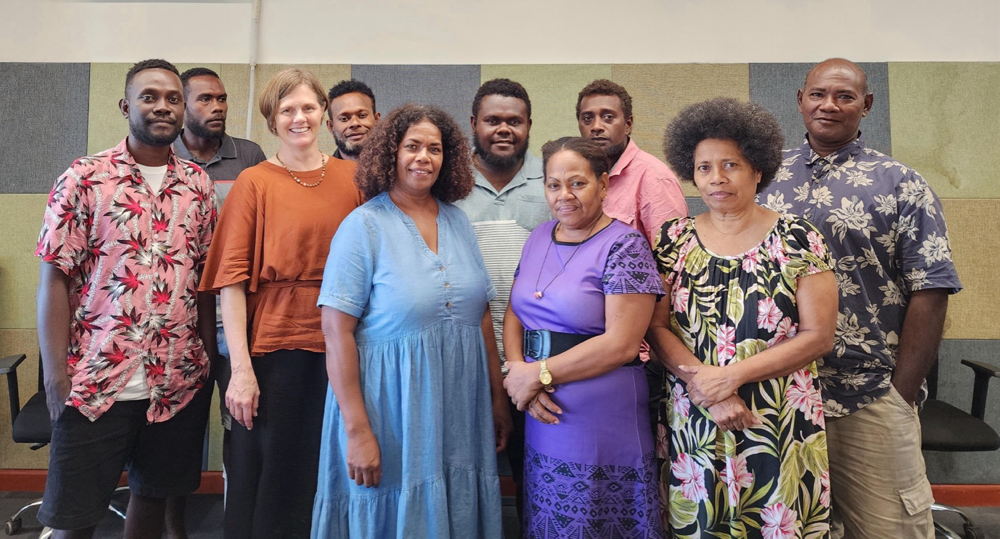For generations, Solomon Islands children and youth have struggled to learn English, a language many of them don’t speak or understand. International research shows that building a solid foundation in a child’s first language is essential for literacy in national and global languages.
The Ministry of Education and Human Resources Management’s 2023 Education Act allows teachers to use local vernaculars for instruction in primary school, but few have any experience of teaching or learning in either Indigenous Solomon Islands languages or Pijin.
These challenges were the context for a meeting held Thursday 18 April at the Panatina campus of Solomon Islands National University (SINU) between academics from the Faculty of Education and Humanities and staff of the Kulu Language Institute of Ranoqa (Kulu). SINU is currently developing a centre for Indigenous languages that will help to foster research, teaching, preservation, and documentation of Solomon Islands languages.
The Kulu delegation was welcomed by Lydia Ghemu on behalf of the Dean Patricia Rodie. The discussion was led by Leonora Houma, Head of the Department of Languages and Communications, and Debra McDougall, Co-director of University of Melbourne’s Oceania Institute and an honorary adjunct professor at SINU.
The Kulu Language Institute, named for the two main languages of Ranoqa Island (Kubokota and Luqa) grew out of founder and director Alpheaus G Zobule’s work on Luqa language translation of the New Testament in the late 1990s. Zobule, currently completing his second PhD at the Australian National University, is also an honorary adjunct professor at SINU.
Zobule found that many people could not read or analyse the languages they spoke. Working with relatives and language enthusiasts, he developed an extensive curriculum in Luqa that describes the grammar of Luqa in terms that they understand. At first, pioneer teachers carried these books from village to village, teaching anyone who would listen. Gradually, the work gained momentum, and the Institute was gifted land at Qiloe to establish a campus.
The Kulu delegation represents the latest generation of leaders in a movement that has grown over decades. The team shared their experiences of enrolling in intensive courses on Luqa grammar and then becoming passionate about the work of teaching others to read, write, and analyse Ranoqan languages. As Kulu Principal and lead Luqa translator Allan Buka explained, “the language led him” to become more deeply involved in both teaching and translation work.
Deputy Principal and Luqa translator Nathan Manoah described his motivation as high rates of illiteracy and educational marginalisation in his extended family. Last year, he established one of the first Kulu extension schools in his home village. Designed to complement rather than replace available primary schooling, these language schools use Luqa as both the language of instruction and language of curriculum for children of all ages.
Kulu has touched the lives of thousands of Ranoqans, supporting not only literacy but a sense self-worth. As Manoah put it, “If I reject my language, I reject myself.” Aldrin Apusae, a veteran Kulu teacher and now Kubokota translator, said that he came to value local languages because they were spoken by his grandparents.
Reginald Jiru, Kulu finance manager and Luqa translator, described his initial skepticism about formally studying a language he already spoke and understood. He described his surprise at discovering that Luqa and Kubokota have rules and patterns that he could described. Lead Kubokota translator Geoffrey Pinau described working in local languages as giving people a secure base from which they can grow.
Timote Kolo, also a Kubokota translator, says that the movement has changed how people think about language in Ranoqa and beyond. He explained that people were coming to study Luqa grammar from islands across Western Province, and that a cohort was now undertaking an immersion course in Luqa language at the Qiloe campus, led by teacher Glorinda Madikolo and apprentice teacher Gasenau Sentrina.
Kulu is entirely self-sufficient, with no funding from government or non-governmental sources. As financial manager Reginald explained, students pay modest fees to attend intensive workshops, but most of the money goes into printing textbooks and providing food for students, with what little is left over going toward building works. From the beginning, Kulu staff have started the work before they found sources of financial support.
Deputy Principal Manoah spoke for the whole delegation when he said that they did not expect that the work they were doing in their own communities would gain national recognition. Several of the delegation admitted to being nervous about meeting highly educated academics and discussing their work at a university. As Pinau explained, the fact that their work may have an impact beyond Ranoqa is a source of joy and motivation.
SINU’s Leonora Houma praised the delegation for developing an exciting community of learning, noting that there was much that the university could learn from their work. She recounted her own experiences in teaching English grammar to SINU students: when she encouraged them to consider a grammatical function or part of speech in their own languages or in Solomon Islands Pijin, they could not do it. They speak and understand, but have never been taught to read, write, and analyse their own languages.
With Lydia Ghemu and Ethel Hirukeni from the Faculty of Education and Humanities, Houma thanked the team for sharing their insights and expressed her excitement about collaborating in coming months and years.
In addition to the relationship with the Faculty of Education, Kulu is connected to SINU’s newly established Centre for Islands Futures, which aims to recognize local solutions to global challenges and to embed Indigenous knowledge in all aspects of teaching, learning, and research at SINU.
By Debra McDougall,
University of Melbourne
Photo caption ; Left to right: Reginald Jiru, Nathan Manoah, Debra McDougall, Aldrin Apusae, Leonora Houma, Timote Kolo, Ethel Hirukeni, Allan Buka, Lydia Ghemu, Geoffrey Pinau.




